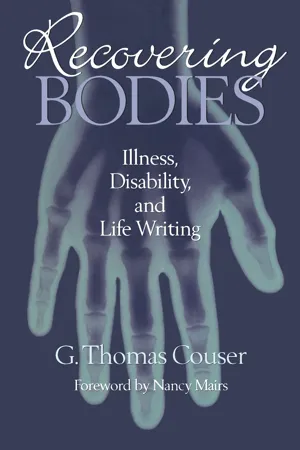
- 336 pages
- English
- PDF
- Available on iOS & Android
About This Book
This is a provocative look at writing by and about people with illness or disability—in particular HIV/AIDS, breast cancer, deafness, and paralysis—who challenge the stigmas attached to their conditions by telling their lives in their own ways and on their own terms. Discussing memoirs, diaries, collaborative narratives, photo documentaries, essays, and other forms of life writing, G. Thomas Couser shows that these books are not primarily records of medical conditions; they are a means for individuals to recover their bodies (or those of loved ones) from marginalization and impersonal medical discourse.
Responding to the recent growth of illness and disability narratives in the United States—such works as Juliet Wittman's Breast Cancer Journal, John Hockenberry's Moving Violations, Paul Monette's Borrowed Time: An AIDS Memoir, and Lou Ann Walker's A Loss for Words: The Story of Deafness in a Family —Couser addresses questions of both poetics and politics. He examines why and under what circumstances individuals choose to write about illness or disability; what role plot plays in such narratives; how and whether closure is achieved; who assumes the prerogative of narration; which conditions are most often represented; and which literary conventions lend themselves to representing particular conditions. By tracing the development of new subgenres of personal narrative in our time, this book explores how explicit consideration of illness and disability has enriched the repertoire of life writing. In addition, Couser's discussion of medical discourse joins the current debate about whether the biomedical model is entirely conducive to humane care for ill and disabled people.
With its sympathetic critique of the testimony of those most affected by these conditions, Recovering Bodies contributes to an understanding of the relations among bodily dysfunction, cultural conventions, and identity in contemporary America.
Frequently asked questions
Information
Table of contents
- Contents
- Foreword by Nancy Mairs
- Preface
- 1. Introduction: Human Conditions—Illness, Disability, and Life Writing
- 2. Medical Discourse and Subjectivity
- 3. Self-Reconstruction: Personal Narratives of Breast Cancer
- 4. HIV/AIDS and Its Stories
- 5. Crossing (Out) the Border: Autobiography and Physical Disability
- 6. Signs of Life: Deafness and Personal Narrative
- 7. Epilogue: The Value of Body Stories
- References
- Index
- Titles in Wisconsin Studies in American Autobiography